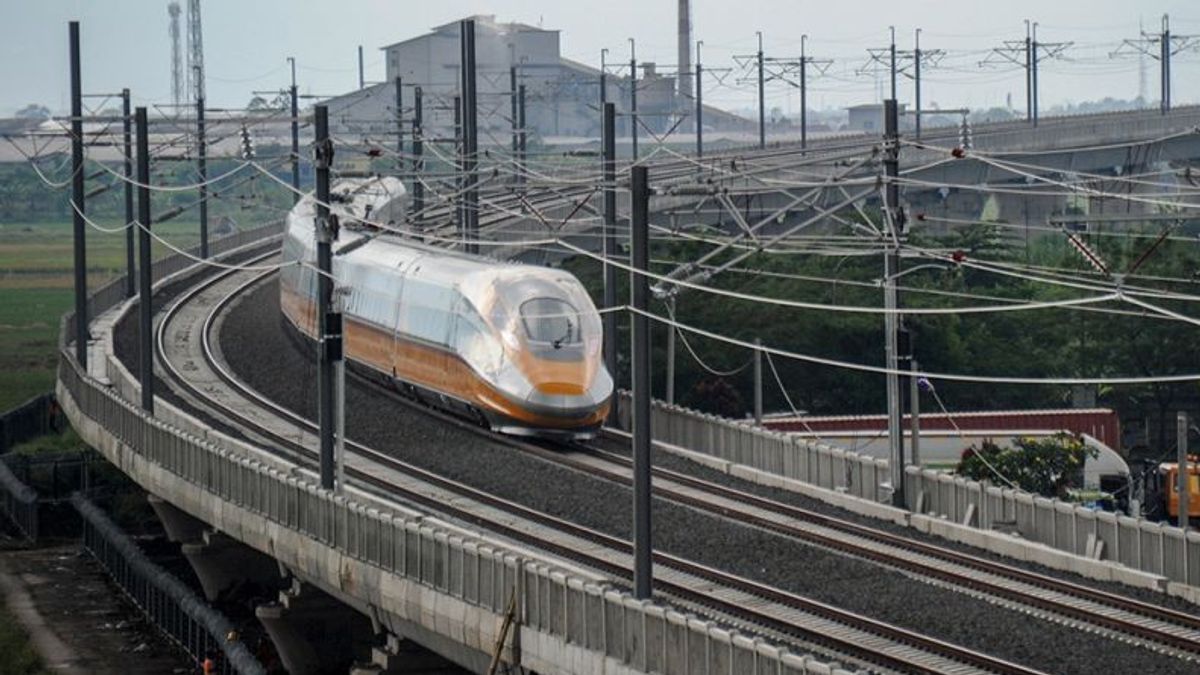JAKARTA The Jakarta Bandung Fast Train (KCJB) is planned to start operating in mid-August 2023. As well as a gift of 78th Indonesian Independence. The initial stage, said the Corporate Communication Manager of PT Kereta Cepat Indonesia China (KCIC) Emir Monti, was carried out by a soft launching if for one month.
The public can try the transportation mode service at speeds of up to 350 km/hour as an introduction and promotion. However, only certain stations can serve ups and downs of passengers.
For example, from Halim, East Jakarta to Padalarang, West Bandung Regency.
"People can also try the integration of KCJB with the Jabodebek LRT which connects Halim KCJB Stations to all Jabodebek LRT service stations and Feeder Trains that integrate Padalarang KCJB Stations with Bandung and Cimahi KAI stations," Emir said in his statement to VOI on June 8, 2023.
Currently, KCIC as the owner of the KJCB project is focusing on testing and commissioning stages using inspection trains.
"After previously all electricity flows on the route were turned off to improve infrastructure, by mid-June 2023, it is hoped that inspection trains will begin to be tested at a certain speed. It will continue to be added from 180 km/hour at this time, 300 km/hour, until it reaches the peak of technical speed reaching 385 km/hour," he continued.
With this speed, the estimated travel time from Jakarta to Bandung is only about 36-25 minutes.
As for the tariff, whether it ranges from Rp. 150,000 to Rp. 350,000, the Emir cannot confirm because it is still under discussion.
The Ministry of Transportation previously recommended that the ticket price for KCJB be IDR 250,000. However, a number of transportation analysts are pessimistic. If that figure is used, KCJB may be empty of enthusiasts. Moreover, there are many transportation options for the Jakarta-Bandung route.
Argo Parahyangan Train only charges prices between Rp95,000 to Rp135,000. Travel buses also set prices that were not much different.
If the comparison can be almost doubled, people tend to look for cheaper prices. Except in urgent circumstances. Those who need time will definitely go up to KCJB.
Thus, it is unlikely that KCJB will be the daily choice for public transportation modes. Moreover, the distance to Bandung only takes 2-3 hours. The location of the KJCB station is also not in the city center.
This fast train is quite unique. In other countries, the high-speed train aims to shift airplane users to trains. In Indonesia, the target is to three categories, namely train passengers, although there are not many, then toll road users, then new passengers," said Djoko Setijowarno to VOI on June 8, 2023.
But I think the manager is good. It could also be that the train will be used as a transportation for faster goods transport services. Tariffs can also be made dynamic, not flat," Joko continued, who is also the Deputy Chair for Strengthening and Regional Development of the Indonesian Transportation Society (MTI).
The next challenge is regarding connecting transportation. In Jakarta, KCJB is connected to LRT and Transjakarta, but in Bandung there is still a need for improvement.
"The current feder is only from Padalarang to Bandung Station, what about residential areas in Bandung Regency? The same is true in Karawang Regency. Local governments must also not let go," added Djoko.
It must be a common concern so that projects that ultimately use the APBN financing are not in vain.
The KCJB development project has actually started in 2016. The initial target was completed in 2018 and operational in 2019. Instead of following the target, the project was delayed until there was a cost overrun of Rp. 18.02 trillion.
Swelling occurs due to a number of things, such as demolition and rebuilding stakepoles due to contractor errors, relocation of utilities, use of GSM frequencies, land acquisition, iron theft, to geological barriers in the construction of tunnels.
In order for the Indonesia-China cooperation project to continue, the Indonesian Government has partially patched the shortage of using APBN funds through the State Capital Participation (PMN) scheme for SOEs involved in the project.
President Joko Widodo (Jokowi) has again issued Presidential Regulation (Perpres) Number 93 of 2021 which is an amendment to Presidential Decree Number 107 of 2015, concerning the Acceleration of Implementation of Jakarta-Bandung High Speed Train Infrastructure and Facilities. In Article 4 of this Presidential Regulation, Jokowi allows the use of APBN funds to finance KCJB.
As much as IDR 4.3 trillion from PMN has now been injected to finance Indonesia's equity portion for cost overruns. The rest is met through credit obtained from the China Development Bank (CDB). Indonesia inevitably has to add more debt to China, even with interest requests that are far from estimated, up to 3.4 percent per year.
The government is currently negotiating the loan with the hope that the interest rate can be reduced to 2 percent. The loan submitted is USD 560 million.
As is known, the composition of KCJB project financing is 75 percent from loans through the China Development Bank (CDB) and the rest is a capital deposit from a consortium of two countries, namely Indonesia-China. The Indonesian BUMN consortium accounts for 60 percent and the Chinese consortium 40 percent.
Director of the Center of Economic and Law Studies (Celios), Bhima Yudhistira, considers it unfair for only the Indonesian government to bear the swelling cost of the KCJB project. Because, this is rooted in the error in the planning and feasibility study process from both parties.
At that time, the project planning process was overoptimistic and creditors offered cheap interest. But once implemented, there was a swelling cost. What are all the responsibilities of SOEs and the Government of Indonesia?" said Bhima when confirmed on June 8, 2023.
If you rely on the state budget, it will cause a chain effect. Consumers are ultimately burdened because ticket prices must be increased in order to pay off debts.
If the ticket price goes up, the number of passengers is at risk of not achieving the ideal projection. As a result, the state subsidies for the high-speed train will be even heavier," he added.
The ideal scheme is to exchange the fast train debt for the planned ticket subsidy program. So, the debt burden can be reduced, while Chinese creditors will subsidize tickets as part of their good intentions towards the Indonesian people.
Bhima also asked the government to be more aware of the pattern of high-speed train debt traps. Do not let this project suffer the same fate as the Hambutonta Port in Sri Lanka.
The Sri Lankan government is known to be unable to pay its debts to China, which reached up to 7 billion US dollars in 2017 as reported by the Times of India. Hambutonta Port eventually fell into the hands of China with control for 99 years.
The English, Chinese, Japanese, Arabic, and French versions are automatically generated by the AI. So there may still be inaccuracies in translating, please always see Indonesian as our main language. (system supported by DigitalSiber.id)













